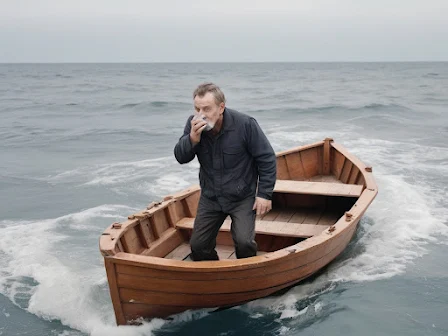Navigating the Vast Unknown: Survival Strategies if Lost at Sea
Finding yourself lost in the open ocean is a daunting and potentially life-threatening situation. The vastness of the sea can be both mesmerizing and unforgiving, requiring specific strategies for survival. Here are essential tips on what to do if you find yourself lost in the open ocean:
1. Stay Calm:
Panic can escalate a dire situation. Take deep breaths and focus on maintaining a calm and composed mindset. This will help you think clearly and make rational decisions, increasing your chances of survival.
Navigating the Jungle: Survival Strategies When Lost
2. Assess Your Situation:
Take stock of your surroundings, resources, and the condition of your vessel or flotation device. Determine the extent of your supplies, including water, food, and any signaling devices. Understanding your situation is crucial for planning your next steps.
3. Signal for Help:
Use any available signaling devices to attract attention. Flares, mirrors, whistles, or even a flashlight can be effective tools. If you have a whistle, blow it at regular intervals to increase the chances of being heard. Create large and noticeable signals that can be spotted from a distance.
Survival Strategies: What to Do if Lost in the Desert
4. Conserve Energy:
Being lost at sea can be physically demanding, and conserving energy is vital for survival. Minimize unnecessary movements and avoid swimming unless you are certain of reaching safety. Floating in a stationary position conserves energy and reduces the risk of exhaustion.
5. Stay with Your Vessel:
If you are adrift on a boat or have any form of flotation device, stay with it. Your vessel is likely more visible to rescuers than an individual in the water. Additionally, it provides some protection against the elements and may have supplies that can aid your survival.
6. Maintain Hydration:
Dehydration is a significant risk at sea. Conserve your water supply by sipping small amounts regularly. Avoid the temptation to drink seawater, as it accelerates dehydration. If possible, try to collect rainwater or use a solar still to distill water.
Top tourist destinations in China
7. Create Shade:
Sun exposure can lead to dehydration and heatstroke. Use available materials to create shade on your vessel or floating device. Clothing, a makeshift canopy, or even a piece of plastic can help shield you from the sun.
8. Stay Visible:
Wear bright-colored clothing or use reflective materials to make yourself more visible. In the vastness of the open ocean, being easily spotted is crucial. If you have a life jacket or any floating object, attach something colorful to it.
10 Tourist Attractions In India
9. Observe Wildlife:
Keep an eye out for wildlife, as it can provide clues to your proximity to land. Birds, in particular, may indicate the presence of nearby land. Flocks of birds feeding or flying in a specific direction could be a sign of land.
10. Stay Positive and Hopeful:
Survival often depends on maintaining a positive mindset. Focus on the tasks at hand and believe in the possibility of rescue. Hope can be a powerful motivator to keep fighting for survival.
Remember, survival at sea requires a combination of preparation, resilience, and resourcefulness. Inform someone of your travel plans before setting sail, providing a potential lifeline if you find yourself lost. By remaining calm, using available resources wisely, and signaling for help, you can increase your chances of surviving the challenges of being adrift in the open ocean.



Post a Comment
0Comments